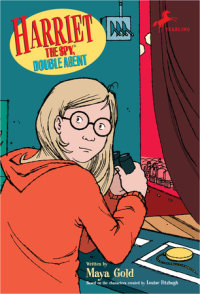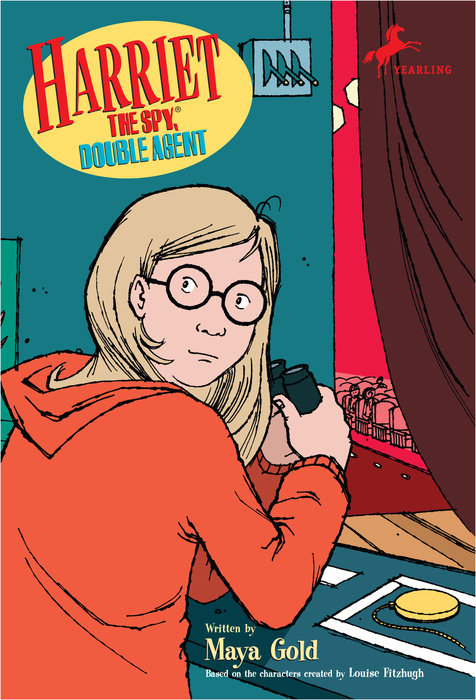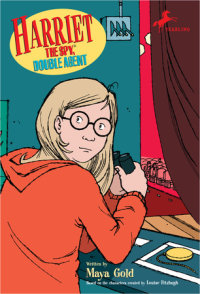Harriet the Spy, Double Agent
Harriet is impressed to learn that the girl she has befriended, now called Annie Smith, is the person who not only created three names–Rosarita Sauvage, Yolanda Montezuma, and Zoe Carpaccio–but also three distinct personalities to match. This girl has potential. Being a spy has always been rather solitary, so Harriet is glad to have a new friend and spy partner. But then Harriet realizes that Annie reveals very little about herself, and indeed, is not telling the truth about where she goes and who she meets on the weekend. Sport says he’s in love with the girl, but Annie lets drop she’s in love with an older man. Harriet can’t understand anything at all about this thing called love–even when she asks Ole Golly for advice, she still wonders. But as Harriet unravels Annie’s mystery, she comes to appreciate the many different kinds of love there are.
Praise for Harriet the Spy® and Her Friends
Harriet the Spy®
“Harriet is . . . wholly relatable whether you’re eleven or several times that age.”—EW.com
Harriet Spies Again
By Louise Fitzhugh and Helen Ericson
Winner of the Edgar Award for Best Juvenile Novel
“Ericson has perfectly captured the voice and pacing of Fitzhugh’s original novel in a seamless rendering of a fresh, enjoyable story for today’s readers.” —School Library Journal
Harriet the Spy, Double Agent
By Louise Fitzhugh and Maya Gold
“Harriet the Spy is back, and Gold does a credible job of maintaining the special character and her crusty charm.” —Booklist
The Long Secret
[STAR] “Written with subtlety, compassion, and [Louise Fitzhugh’s] remarkable ability to see inside the minds of children.” —School Library Journal, Starred
Sport
[STAR] “A worthy successor to Harriet the Spy—and that is high tribute.” —Booklist, Starred
An Excerpt fromHarriet the Spy, Double Agent
CHAPTER 1
Harriet M. Welsch took out the flashlight that always hung from her spy belt, snapped off the overhead light, and stepped into the bathtub. It was precisely 9:29 p.m. It felt strange to stand in the tub fully dressed (except for her sneakers, which would not do), but spies were accustomed to doing strange things. Harriet peered through the narrow exhaust window, set over a twin row of black and white checkered tiles, and hoped that her contact, the girl with four names, understood the importance of promptness.
A faint glow of peach-tinted streetlight shone through the pane. Harriet stared over the treetops of East Eighty-seventh Street at the carved marble cornices on the south side of the street. It was snowing again, and a light stripe of powder lined every bare twig. She wished they'd agreed on an earlier time. Nine-thirty was dangerously close to her bedtime, when one of her parents might venture up to the third floor to bid her a distracted goodnight. Revise, she informed herself. First thing tomorrow. She narrowed her eyes, squinting into the snowfall.
A circle of light snapped on in a dark window across the street. Could that be it? The angle looked lower than Harriet had expected. She held her breath as the new light snapped off and on twice more. The signal!
Harriet lifted her flashlight and clicked her switch in the same pattern. A grin spread across her face. It works, she thought, already starting to dream up a message code far more complex than a simple flash-three for "I'm here." Didn't sailors have some kind of code alphabet, like those colorful flags that flapped over Long Island yacht clubs and showed up on beach towels? Semaphore, that was the name for it. She and the girl with four names could invent an East Eighty-seventh Street semaphore, with different flashlight patterns for every letter.
The phone rang in the hall. Harriet jumped from the tub, singing out, "It's for me!" before her mother could pick up downstairs. She skidded into the hallway and grabbed the receiver, tucking it into her shoulder as she pulled the long cord through her bedroom door. "It worked!"
"What worked?" The voice was a boy's.
"Sport?"
"Of course. What worked?"
"Nothing," said Harriet, hoping she sounded blase. "I thought you were Annie."
"Oh," said Sport. "Annie." The crack in his voice, one note childlike and one newly husky, made him sound like a bad country singer. "How can her real name be Annie Smith? Annie Smith."
"So?" Harriet twisted the phone cord around her left thumb. She didn't approve of repeating oneself, aloud or in prose. Harriet was going to be a writer, and she knew that every word mattered. Her best friend, Sport, who dreamed about playing first base for the Mets, was not as precise. She had high hopes for Annie, however. The signal had flashed at exactly nine-thirty.
Annie had moved to their neighborhood back in September, under mysterious circumstances. The two-doctor couple across the street, Morris and Barbara Feigenbaum, who had houseplants and patients instead of children, had taken in Barbara's twelve-year-old niece. This new neighbor had introduced herself to Harriet as Rosarita Sauvage, to her moony-eyed schoolmate Sport as Yolanda Montezuma, and to others as Zoe Carpaccio. It had come as a shock to discover, a few days before at Thanksgiving dinner, that all three of these remarkable names belonged to the same girl, whose birth name was duller than toast.
But Annie herself had potential. The girl had created not one but three new identities, each with a personality to match. There was also the unanswered question of why she'd been expelled from Sport's school, and transferred to Harriet's, just a few weeks before Christmas vacation. She must have done something outrageous, thought Harriet, and I'm going to find out what it was. That might have been a tall order for some seventh graders, but Harriet M. Welsch was an experienced spy. Ever since she could print, she had taken extensive notes in a series of green composition books, which she kept locked in a trunk at the foot of her bed. "A writer needs to know everything," her former nanny, Ole Golly, had said many times. "It's all grist for the mill."
"I'm not sure I can love a plain Annie," Sport sighed. "She's such a Yolanda."
"Get used to it," Harriet snapped, trying to hide her impatience. Falling out of love over a name seemed as flimsy as Sport's claim that he'd fallen in love with Yolanda's green shoes. Harriet wondered if Sport knew what love really meant.
Not that she was an expert on love. Ole Golly had sidestepped Harriet's questions in every phase of her courtship, estrangement, and joyous reunion with her husband, George Waldenstein, and Harriet's parents restricted themselves to tossing off the occasional "Love you," as if prefacing it with an "I" would take too much of an effort. Maybe I ought to try spying on someone in love, Harriet thought, if it doesn't involve too much kissing. She disliked long kisses in movies, which always made her wonder what the two actors had eaten for dinner.
"Listen," she said, "I'm on an assignment from Grenville. I'm walking plain Annie to school in the morning. If you'd like to meet us, arrive at the corner of East End by eight-twenty-three. Let's synchronize our watches."
"What?"
Harriet sighed. Sport had known her since preschool, and it drove her crazy when he didn't recognize everyday spy terminology. She felt this was part of his job as best friend. "Make sure we both have the same time. What does your watch say?"
"Nine-thirty-two," said Sport.
"Two minutes slow. Fix it," said Harriet, and hung up. She liked to hang up without saying goodbye. It made her last words sound important. She went to the trunk and took out a green notebook, her twenty-first.
SPORT IS NO LONGER CONVINCED OF HIS FEELINGS FOR ANNIE.


